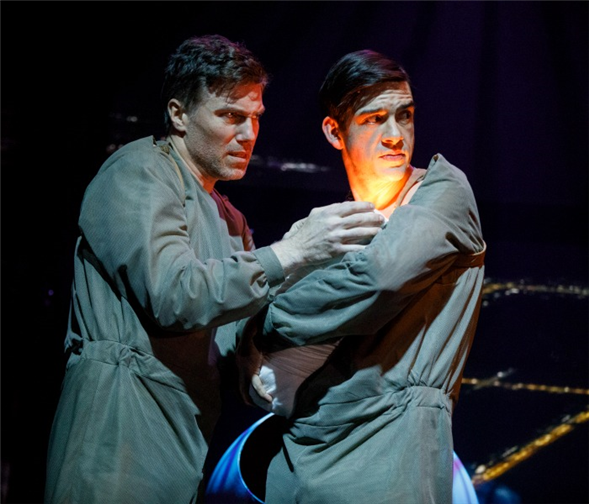Translate Page

How playwright-director Robert O'Hara's new show sticks it to the patriarchy
---
"I love fables and I love allegories because you never know where they're going to lead you," says Robert O'Hara, whose world-premiere comedy Mankind is currently running at Playwrights Horizons. "It's like following a rabbit down a hole." That's certainly the experience audiences have at O'Hara's tongue-in-cheek critique of the patriarchy, set a 100 years or so hence when -- after centuries of mistreatment and government control -- women have been legislated out of existence. Men can now reproduce, just don't ask how. According to O'Hara, that's the beauty of fantastical writing.
"I wanted to explore what it would be like to watch two men deal with a pregnancy and whether this couple wants to have a child or not," says O'Hara, who also directs. "But the story morphed into a more explicit expression of religion, desire, and power. It's rare as a playwright that you're given the opportunity -- or the encouragement -- to be so imaginative. People want things to tie together neatly. Sometimes it's nice to upend that in your storytelling. That's what was fun about writing this. You're going into the unknown and that to me is the essence of a fable. Fables are about tossing as many possibilities into the air and you're simply catching story lines as opposed to catching answers. It requires a kind of faith."
Wild satirical tales that explore real-life issues are O'Hara's signature as both a playwright (his autobiographical, multi-genre Bootycandy about being a gay black man in America; his outrageous examination of addiction Barbecue) and director (the multicultural Wild West musical Bella). But he says as crazy as things may get in his work, he's always careful to give audiences relatable characters to latch on to. "In Mankind the two leads have to play the quote-unquote straight men of the play," he explains. "Everyone else can be a little bit off-center, but the couple has to be grounded because they are taking us through the story."
{Image1}
O'Hara gravitates to over-the-top pieces because they are "a safe place to talk about big things that naturalistic plays don't allow," he says. But he's also aware that in the midst of the #MeToo movement, his humor could be misinterpreted. "I wanted to make sure the context of the play was presented correctly, explaining that this was not a comedy about things that are currently happening," he says. "It is not a feminist take on anything. There are no female characters and it was written by a man. I am a feminist, but that is not what I wrote this play about. I wrote this play about the patriarchy and about its dangers and downfall."
And yet, though Mankind doesn't directly address current events, it's certainly relevant to the tumultuous time we're living in. "I think our reality -- especially now -- is so scary and sad and stressful and dangerous," O'Hara says. "So the idea of being transported to a space that we can identify through allegory helps us to get our heads around larger issues such as religion and women's rights and civil rights and human rights and all the 'isms' that are in our lives. They're much more accessible if you don't approach them directly. I'm not interested in documentary theatre. Other people do that very well. I'm interested in a transformative experience where you start out in one place thinking you are going along this road that sort of looks familiar, and then you end up levitating halfway through the play and finally you end up on a different planet."
---
Follow Frank Rizzo at @ShowRiz. Follow TDF at @TDFNYC.
Top image: Anson Mount and Bobby Moreno in Mankind. Photos by Joan Marcus.
TDF MEMBERS: Go here to browse our latest discounts for dance, theatre, and concerts.